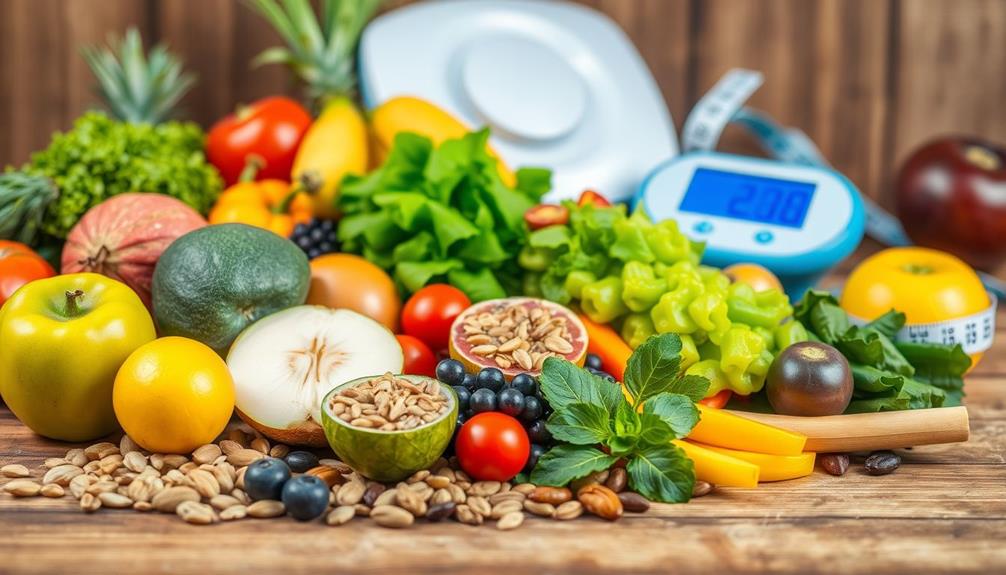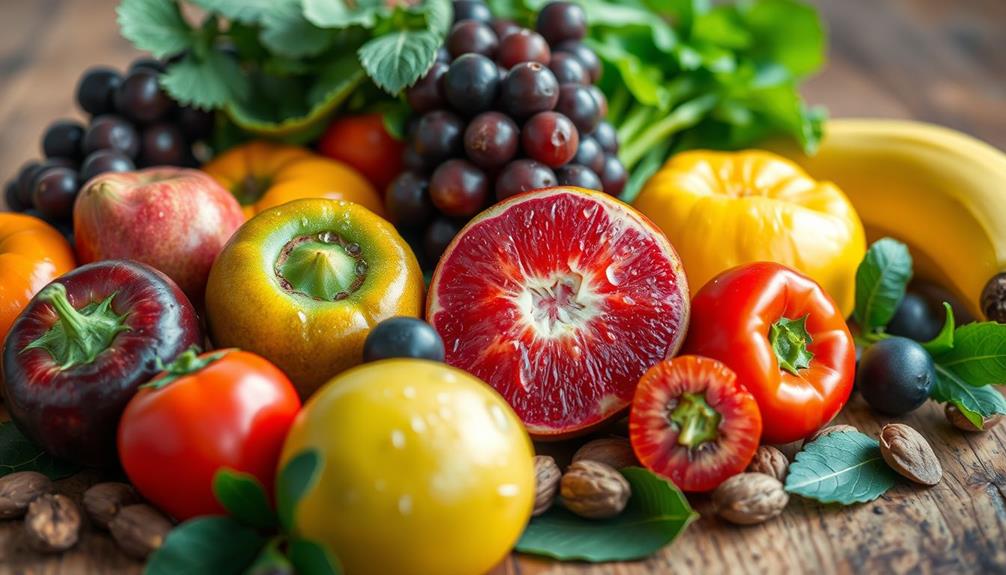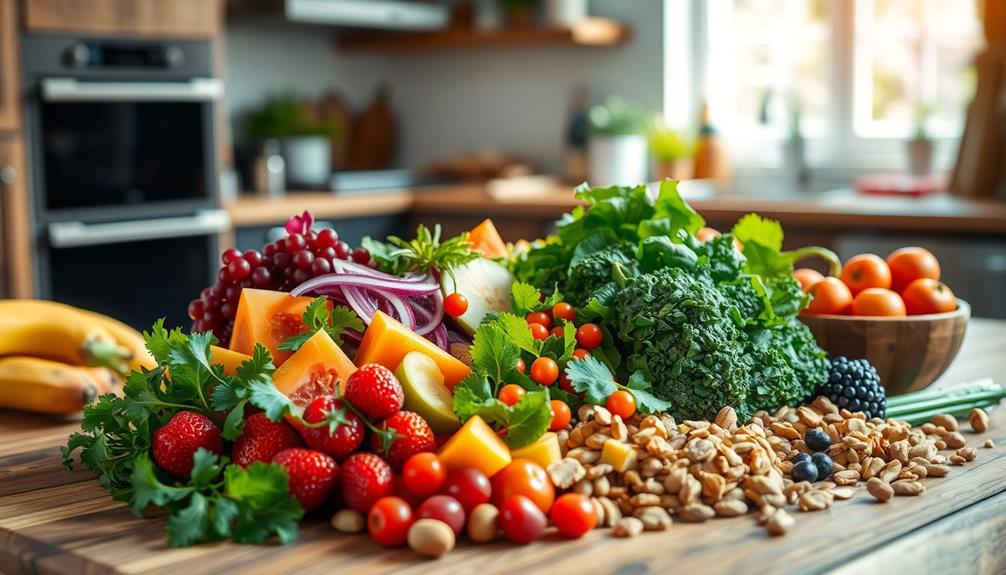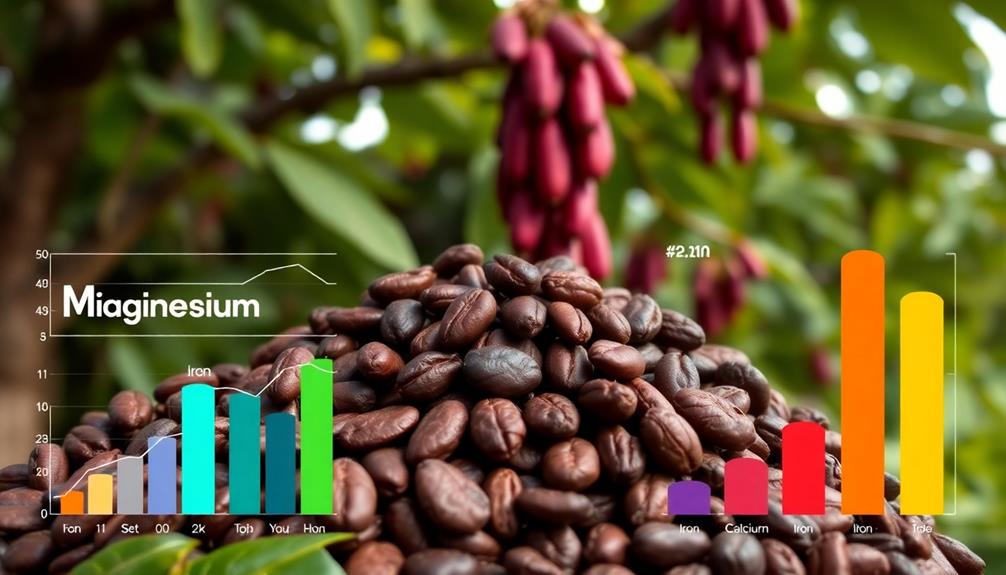Yes, you can eat raw food, and it may boost your energy and provide essential nutrients. The raw food diet typically includes uncooked fruits, vegetables, nuts, and seeds. However, it comes with risks like nutrient deficiencies, particularly in vitamins B12 and D, calcium, and omega-3 fatty acids. You also face food safety concerns from pathogens found in raw foods. It's important to monitor your health and consider a balanced diet that mixes raw and cooked foods for ideal nutrition. If you want to explore the benefits and precautions further, there's more to uncover about this lifestyle.
Key Takeaways
- The raw food diet includes uncooked fruits, vegetables, nuts, and seeds, promoting nutrient intake and potential weight loss benefits.
- Health benefits include lower chronic disease risks, improved gut health, and increased energy levels from high fiber and nutrient-rich foods.
- Nutritional risks involve deficiencies in vitamin B12, calcium, and omega-3 fatty acids, impacting overall health and well-being.
- Raw diets may expose individuals to harmful pathogens, increasing the risk of foodborne illnesses if food safety practices are not followed.
- Individual dietary needs must be considered, with a balanced approach that includes both raw and cooked foods for optimized health.
Understanding the Raw Food Diet
The raw food diet is all about embracing uncooked, unprocessed foods to maximize nutrient intake. This approach primarily includes raw fruits and vegetables, nuts, seeds, and sprouted grains, while avoiding heating foods above 104–118°F (40–48°C).
Advocates of the raw food diet believe it offers numerous health benefits, such as increased energy levels and weight loss, due to the high intake of nutrient-dense foods. Additionally, consuming raw foods can provide rich sources of antioxidants, which are beneficial for overall health rich in antioxidants.
However, you might face some nutritional challenges. Essential nutrients like vitamin B12, iron, and omega-3 fatty acids can become deficient, which means careful meal planning and potential supplementation are necessary.
Preparation methods like juicing, blending, soaking, sprouting, and dehydrating provide variety while keeping foods in their natural state. Yet, it's vital to prioritize food safety. The risk of foodborne illnesses increases when consuming raw animal products or improperly handled uncooked foods.
You need to be mindful of how you store and prepare these ingredients to mitigate health risks. Ultimately, understanding the raw food diet means balancing its appealing health benefits with the need for proper nutrition and safety measures.
Health Benefits of Raw Foods

While many people might focus on the challenges of adopting a raw food diet, the health benefits are hard to ignore. Consuming a diet rich in fruits and vegetables provides essential vitamins, minerals, and antioxidants that can enhance your overall well-being. The high fiber content aids digestion, promotes satiety, and can even lead to weight loss; studies show individuals losing 22–26 pounds over 3.5 years on raw diets.
Additionally, a raw food diet is linked to a lower risk of chronic diseases. Vegans, for instance, report a 75% lower risk of high blood pressure. The nutrients found in raw foods, including water-soluble vitamins and natural enzymes, support digestion and metabolic health.
Here's a quick look at some key health benefits:
| Health Benefit | Description |
|---|---|
| Weight Loss | Promotes satiety and aids in weight management |
| Chronic Disease Risk | Lower risk of conditions like diabetes and heart disease |
| Improved Digestion | High fiber content enhances digestive health |
Incorporating more raw foods into your diet can lead to improved gut health and reduced inflammation, boosting your energy levels and overall quality of life.
Nutritional Risks and Deficiencies

Adopting a raw food diet can come with considerable nutritional risks and deficiencies that you need to be aware of. One major concern is the lack of essential nutrients, particularly vitamin B12, calcium, iron, and omega-3 fatty acids, due to the exclusion of animal products. This can lead to nutritional deficiencies that greatly impact your health.
For instance, inadequate calcium intake increases your risk of osteoporosis, as a 2005 study suggests that long-term adherence to a raw food diet may result in lower bone mass. Additionally, some studies highlight the significance of dietary adjustments to reduce uric acid levels for overall health.
Furthermore, low protein levels from a raw food diet can weaken muscle mass and bone density, heightening the risk of sarcopenia and fractures, especially in older adults. Nutritional imbalances can also lead to issues like anemia and fatigue, which may leave you feeling drained.
It's crucial to recognize that around 70% of women on a raw vegan diet report menstrual irregularities, indicating potential fertility problems. So, if you're considering this diet, make sure you plan carefully to avoid these nutritional deficiencies and maintain a balanced intake of essential nutrients.
Types of Raw Food Diets
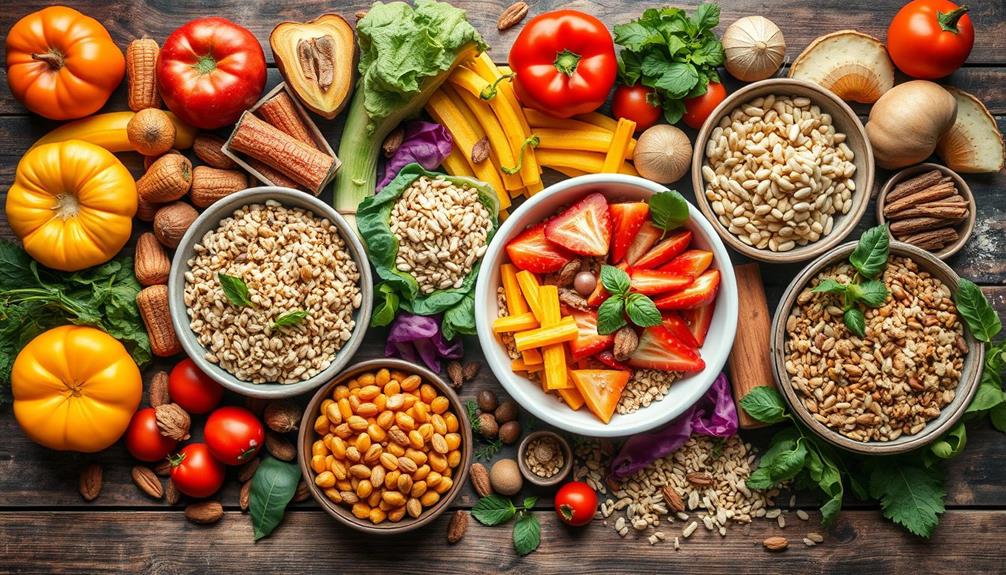
Exploring the diversity of raw food diets reveals a range of options that cater to different dietary preferences and nutritional needs.
These diets can enhance nutrient absorption and promote weight loss through low-calorie, high-fiber foods, making them appealing to many.
Here are the three main types of raw food diets:
1. Raw Vegan Diet: This approach emphasizes a plant-based diet, focusing solely on uncooked fruits, vegetables, nuts, seeds, and sprouted grains, with at least 75% of the diet being raw.
It excludes all animal products, promoting health benefits while also posing health risks like nutrient deficiencies. Boosts immune system function due to high vitamin and antioxidant levels.
2. Raw Vegetarian Diet: This diet includes plant-based foods along with raw animal products like unprocessed dairy and raw eggs.
It offers more flexibility compared to strict veganism and can help in addressing some nutritional gaps.
3. Raw Omnivorous Diet: Allowing the consumption of raw animal products, such as raw meat, fish, and dairy, this diet can provide essential nutrients that may be lacking in a plant-based approach.
While raw foodism can lead to various health benefits, it's crucial to be aware of the health risks and the potential need for careful planning to avoid processed foods and deficiencies. It’s important to consider the potential lack of certain nutrients such as Vitamin B12, iron, and calcium when following a raw food diet. Additionally, there may be an increased risk of foodborne illness from consuming raw foods. When considering a raw food diet, it’s essential to research and understand raw food diet facts in order to ensure that all nutritional needs are being met. Consulting with a healthcare professional or nutritionist can also be helpful in creating a balanced and nutritious raw food meal plan.
Safe Food Preparation Techniques

Preparing raw foods safely is crucial for enjoying their health benefits without risking foodborne illnesses. Start by washing fruits and vegetables thoroughly under running water to remove dirt and potential pathogens. This simple step helps eliminate harmful bacteria that can lead to illness.
Additionally, consider using a vacuum designed for dust removal to maintain a clean kitchen environment, as a clean space can further reduce the risk of contamination superior dust and allergen elimination.
When it comes to grains and legumes, soaking them not only enhances digestibility but also minimizes toxin risks; for instance, soaking beans for several hours is recommended before consumption.
If you're handling raw animal products, like fish for sushi or unpasteurized dairy, make sure they come from trusted suppliers. Unpasteurized products can harbor dangerous microorganisms, so sourcing wisely is key.
Use separate cutting boards and utensils for raw and cooked foods to prevent cross-contamination, which can easily lead to foodborne illnesses.
For raw meat consumption, stick to food safety guidelines, including proper sourcing and careful handling. This is crucial to avoid exposure to pathogens like Salmonella and E. coli.
Pros and Cons of Raw Diets
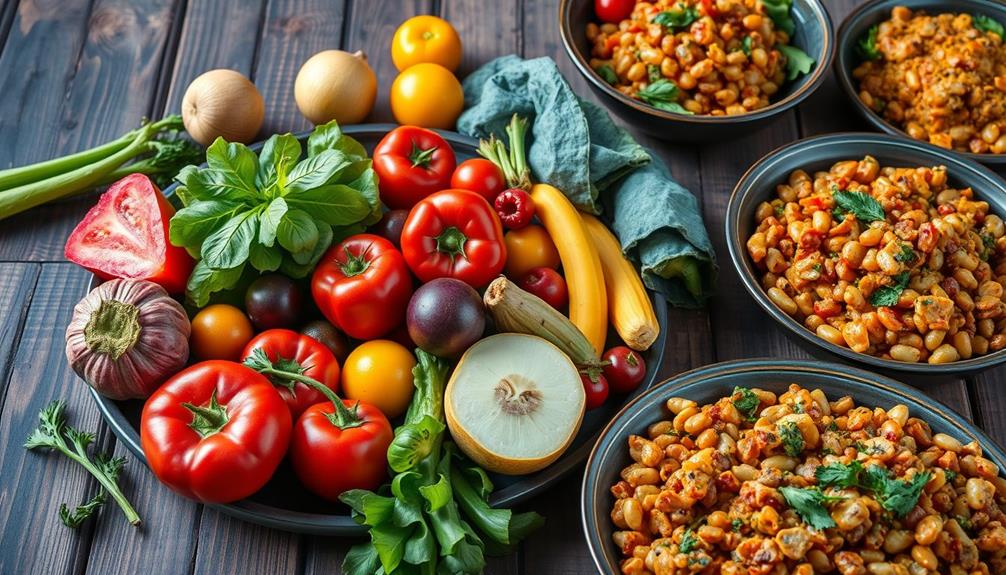
Raw diets offer a vibrant array of fruits and vegetables that can boost your overall health and energy levels.
They're rich in vitamins, minerals, and antioxidants, providing numerous health benefits. Additionally, incorporating a balanced diet and regular exercise can enhance the advantages of a raw food diet, leading to improved overall health effective strategies for weight loss.
However, there are pros and cons to evaluate before diving in.
Pros:
- Weight Loss: Low calorie density and high fiber content help regulate appetite and promote satiety.
- Enhanced Digestive Health: The high fiber content can improve digestion and regularity.
- Nutrient-Rich: Fresh produce is packed with essential vitamins and minerals.
- Reduced Processed Foods: You'll likely consume fewer processed foods, which can benefit overall health.
Cons:
- Nutrient Deficiencies: You might face deficiencies in vitamin B12, iron, and omega-3 fatty acids if your diet isn't well-planned.
- Foodborne Illnesses: Raw diets can expose you to harmful pathogens, increasing the risk of illnesses like E. coli and Salmonella.
- Digestive Issues: Some people may experience digestive discomfort if they consume too much raw food without variety.
- Restrictive Nature: The limitations of a raw diet can lead to challenges in meal planning and variety.
Weigh these factors carefully before committing to a raw diet!
Expert Opinions on Raw Foods
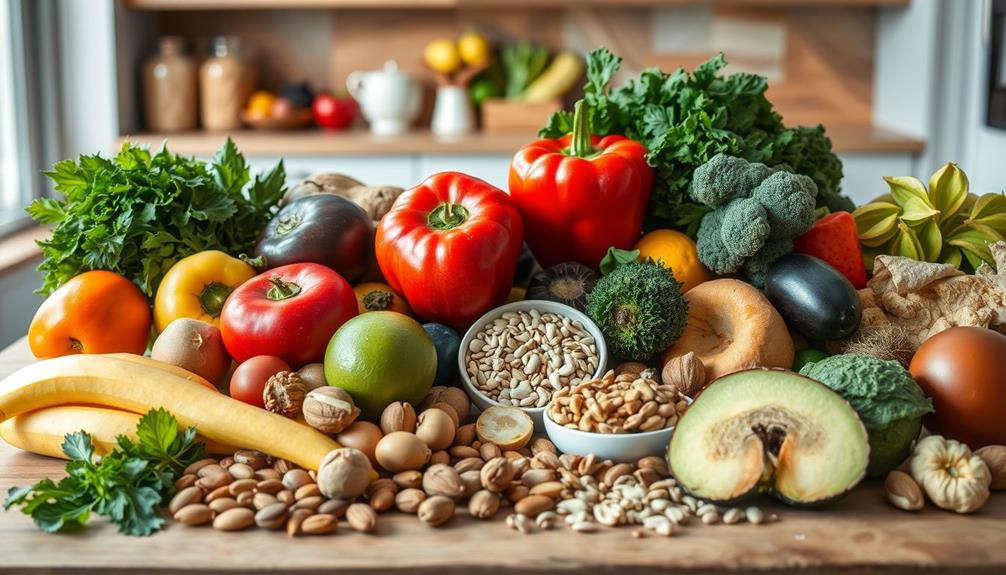
When it comes to raw foods, experts often debate the preservation of nutrients versus the risks involved.
Some studies suggest that certain essential oils, like eucalyptus oil, may enhance respiratory health and support overall wellness, which can be an important consideration for those consuming raw foods.
You might find that while some advocate for a raw diet's benefits, they also caution against potential long-term health issues.
Ultimately, your dietary choices should be tailored to your individual needs and lifestyle for the best outcomes.
Nutrient Preservation Debate
While many believe that raw foods retain more nutrients than cooked ones, the debate over nutrient preservation is far from straightforward. Here are some key points to evaluate:
- Raw food diets can offer higher levels of vitamins and antioxidants, especially in fruits and vegetables. Additionally, incorporating a variety of raw foods can be part of a broader strategy for achieving a balanced diet and managing a healthy budget through cost-effective meal planning effective meal planning.
- Some nutrients, like lycopene and beta-carotene, become more bioavailable through cooking, enhancing nutrient absorption.
- Strict adherence to raw diets may lead to deficiencies in essential nutrients, such as vitamin B12 and omega-3 fatty acids, primarily found in animal products.
- Research indicates that increased intake of raw foods correlates with lower risks of chronic diseases like heart disease and diabetes, but this doesn't negate the importance of balanced nutrition.
Nutritional experts often highlight the health benefits of raw foods, yet they also emphasize cooking's role in ensuring food safety and improving overall nutrient availability.
The challenge lies in finding a balance that allows you to enjoy the advantages of both raw and cooked foods, maximizing nutrient preservation while minimizing the risk of deficiencies.
Long-term Health Implications
Adopting a long-term raw food diet can lead to various health implications that warrant careful consideration. While you might enjoy short-term benefits like weight loss and improved digestion, research indicates that sticking to a strict raw food diet can result in significant nutrient deficiencies.
Individuals with Borderline Personality Disorder (BPD) may experience heightened emotional responses, which can complicate dietary choices and adherence to a raw food regimen. Key nutrients such as vitamin B12, calcium, and omega-3 fatty acids are often lacking, which can lead to anemia and reduced bone density.
Moreover, studies show that women following a raw vegan diet for extended periods face a higher risk of menstrual irregularities, with around 70% reporting disruptions. This raises concerns about long-term health implications and overall well-being.
Nutritional experts stress the importance of careful meal planning and supplementation to counteract inadequate protein intake and low calorie consumption.
A balanced approach that incorporates both raw and cooked foods may provide ideal health benefits while minimizing the risks associated with a restrictive raw food diet. By being mindful of these factors, you can better navigate the complexities of a long-term raw food lifestyle.
Individualized Dietary Choices
Maneuvering the world of raw foods requires you to reflect on your unique dietary needs and health conditions. Individualized dietary choices are vital since the raw food diet may not suit everyone.
It's important to take into account how your dietary decisions may influence various key domains of development in psychology, especially if you have children who are growing and require a well-rounded diet. Here are some key considerations:
- Nutrient Deficiencies: Be aware of potential deficiencies in vitamin B12, iron, and protein.
- Caloric Intake: Monitor your caloric intake to guarantee you're meeting your energy needs.
- Nutrient Levels: Regularly check your nutrient levels to avoid health complications like anemia and bone density loss.
- Balanced Approach: A mixed diet, combining raw and cooked foods, can enhance overall health by optimizing nutrient absorption.
Experts recommend a balanced approach to nutrition, emphasizing that while raw foods can boost certain nutrient intake, cooking often improves bioavailability.
This means a mixed diet might be your best bet to optimize health outcomes. By being mindful of your dietary choices, you can tailor your food intake to suit your lifestyle and health requirements, helping you thrive on your nutritional journey.
Tips for Starting a Raw Food Diet
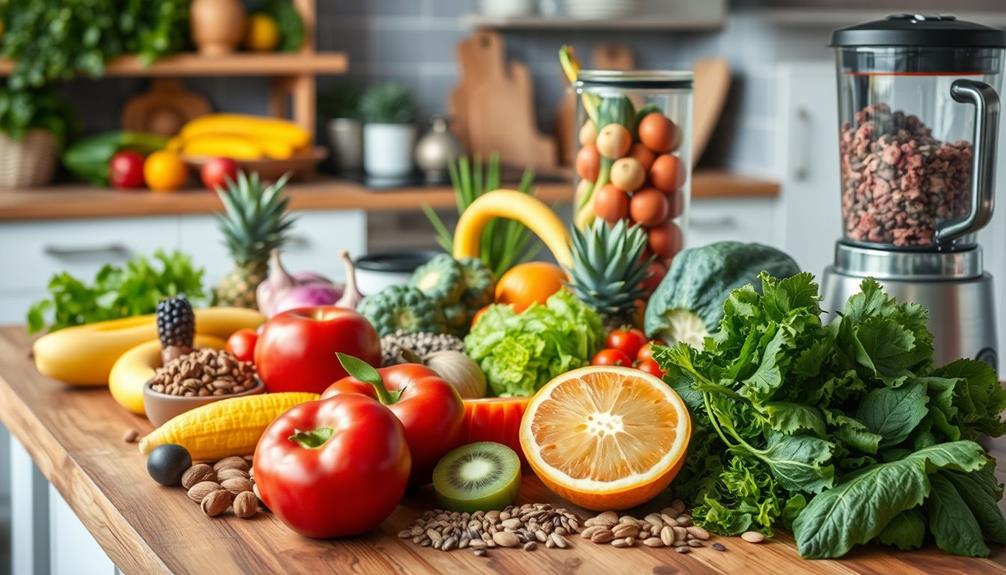
Starting a raw food diet can feel overwhelming, but easing into it makes the change smoother and more enjoyable. Begin by gradually incorporating uncooked fruits, vegetables, nuts, and seeds into your meals, aiming for at least 50% of your diet to be raw. This gradual shift helps your body adapt without feeling deprived.
Additionally, being mindful of financial considerations for elderly care can help you maintain a sustainable approach to purchasing fresh produce.
Investing in essential kitchen tools like a high-quality blender and food processor will simplify meal prep. You'll find these tools invaluable for making smoothies, soups, and nut butters.
To keep things interesting, experiment with various recipes, including salads, smoothies, and dehydrated snacks, ensuring you don't fall into a rut.
Focus on seasonal and locally sourced produce to maximize flavor and nutrition while keeping costs down. Joining online communities or local groups can also provide much-needed support.
These platforms offer recipe sharing and motivation, helping you stay committed to your raw food lifestyle. Remember, adapting is a journey—embrace it, and enjoy discovering new ways to nourish your body with vibrant, raw ingredients!
Frequently Asked Questions
Is a Raw Food Diet Healthy for Humans?
A raw food diet can be healthy for you, promoting weight loss and nutrient intake. However, you might face nutritional deficiencies and limited variety, so careful planning's essential to guarantee you're meeting all your dietary needs.
Why Can't Humans Eat Raw Food Anymore?
You might find that humans can eat raw food, but safety concerns arise from harmful pathogens in certain items. Cooking reduces these risks, enhances flavors, and improves nutrient absorption, making it a preferred choice for many.
What Are the Benefits of Eating Raw Foods?
Imagine biting into a crisp apple, bursting with flavor and nutrients. Eating raw foods boosts your energy, aids digestion, and enhances skin health, making you feel vibrant. Plus, you'll naturally consume fewer calories.
Could Humans Ever Digest Raw Meat?
You can digest raw meat, as your body is equipped to handle it. However, be cautious of pathogens. Cooking meat reduces the risk of harmful bacteria, making it a safer choice for your health.
Conclusion
In the garden of health, raw foods are like vibrant flowers, offering a burst of nutrients and energy. Yet, as with any garden, you must tend to it wisely, balancing the beauty with caution. Embrace the crispness of fresh fruits and veggies, but beware of hidden pests—nutritional risks and safety concerns. By nurturing a mindful approach, you can cultivate a thriving raw food journey that nourishes both your body and spirit, blossoming into a healthier you.











